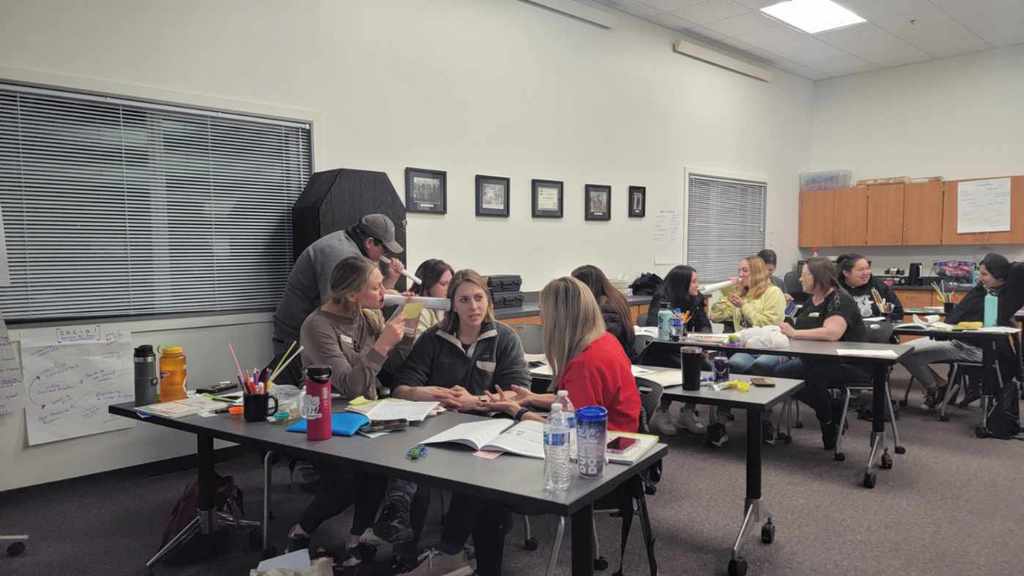
Rates of anxiety, depression, and youth suicide are up nationwide according to an advisory on youth mental health released by the U.S. surgeon general. The same is true for Alaska. In Petersburg, the local medical center is training community members to help youth in crisis. And they’re providing all the training free of charge.
More than 20 people fill a conference room at Petersburg’s Fire Hall on a Saturday in December.
They’re here for an eight-hour training in Youth Mental Health First Aid. They’re listing off signs and symptoms of kids in crisis, in alphabetical order.
Katie Holmlund is the co-founder of Kinder Skog, an after school outdoor program for kids. She’s one of the facilitators of the training. She said she knows conversations with youth in crisis are hard, but talking with them can save lives.
“Hopefully, with this training, more adults will be willing to lean into those hard conversations, because it’s not going to be easy either way,” she said. “But hopefully, at the end of the day, we still have that one young person.”
According to a recent report from the Center from Disease Control and Prevention, one in five high school students said they seriously considered suicide in 2021.
Alaska has the second highest rate of suicide deaths in the nation. And suicide is the second leading cause of death for those aged 10 – 24.
It’s hard to know what the numbers are in Petersburg because federal law protects the privacy of patients. That means that providers can’t share information that could identify someone. So, the state releases public health data by grouping rural areas or small towns together.
Becky Turland is the Community Wellness Specialist at Petersburg Medical Center. And she’s another facilitator. She said we should take those national and statewide numbers seriously because Petersburg is no different.
People in the training are learning how to recognize the signs and symptoms that a kid is facing a mental health challenge. Those challenges include anxiety, depression, eating disorders, substance use, and attention deficit disorder. They’re learning how to respond to those signs and symptoms, and how to connect kids to the resources that are available.
But they won’t be diagnosing anyone. That’s left to professionals. Turland said it’s a little like the difference between emergency responders and doctors.
“We’re not there to diagnose anything. We could say, ‘Ooh, that might look like it,’ but we’re not diagnosing,” she said.
According to Holmlund, sometimes the best response is just to listen.
“Listening non judgmentally and giving reassurance. Those are daily skills,” she said.
Other times, the young person needs to be connected with professional help, Holmlund said.
“If you need help, I can put you in the right place to get it or connect you with that resource,” she said. “Something that – this help does exist, and here’s how you can access it.”
Holmlund said getting concrete help for a problem is an example of something called a ‘protective factor.’ All kids face difficulties to one degree or another. But protective factors can make those difficulties manageable.
“Protective factors are the really good things that we can be doing to support and balance out and create resilient and strong kids,” she said.
And she said that a sense of belonging is one of those important protective factors. She hopes that these trainings can help build that for Petersburg’s young people by creating a wider network of adults that talk about difficulties with kids.
This training is the first of four that the medical center plans to hold. They’re made possible by a $10,000 grant from the Petersburg Community Foundation. That paid for Turland and Holmlund to get certified as facilitators. It also pays for some of their time leading the trainings.
Elementary school teacher Jolie Norman is taking the training. She said she learned that kids as young as her first graders can show signs of anxiety.
“It’s pretty scary to know at that young they’re already experiencing something like that,” she said. “When they don’t even understand the emotions that they have.”
She said she’ll be looking for signs of anxiety, like trouble focusing and irritability, with the kids in her class.
“I’m prioritizing social emotional learning in my classroom and really giving my students the tools to self regulate themselves before there’s any type of crisis or know how to reach out to somebody for help,” she said.
The next two trainings will be just for employees in the school district. The district will pay their staff to attend, using money from professional development grants.
But Holmlund and Turland will run another one for the wider community. Holmlund encourages anyone who comes into contact with kids to sign up.
“The more adults within our community, the stronger that safety net is,” she said. “So if I’m not able to reach out to the youth about a situation they’re experiencing, maybe I can reach out to Becky and say, ‘Hey, could you check in on so and so.’ We’ll have this beautiful network of people that we can reach out to and make sure our kids are supported.”
Turland agrees, and said the skills need to extend beyond the school system.
“It’s time to get our community on board,” she said.
The community-wide training is scheduled for April 13, 2024. Anyone interested in attending can email Katie Holmlund at kholmlund@pmc-health.org











